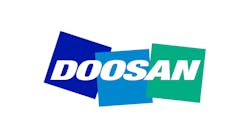There were 11 judges on the panel for the competition, most of whom were professors of engineering or high-level academics from Taiwan's leading engineering schools, universities and engineering centers. Mr. Yoshio Horikiri, a representative of a publishing company from Japan, and I were the only judges on the panel who were from outside Taiwan.
We viewed 46 innovative machines that were being shown at the show. As you would expect from companies that are among the leading exporters of machine tools in the world, Taiwanese machine tool manufacturers are making remarkable advances. (Taiwan is the fourth largest exporter of machine tools in the world.)
The entries in the Award for Excellence competition included a lathe/grinder combination; a five-axis gantry machining center with five meters of travel -built for big parts; and a bar feeder that has 10 patents on it.
Many of the companies involved in the competition were very quick to point out that they hold patents or have patents pending on the advances they have made in their machines, and said outright that their designs aren't copied from anyone. I think that's a reaction to their past, but it's also a testament to what they're doing: They're hiring engineers - many of whom are being schooled in Taiwan - and they're using them to develop new ideas about machines and machining.
There were many times that my fellow judges stopped while we were reviewing machines to talk to a former student who either was responsible for or instrumental in producing the developments on the machines that we were looking at, and there was a huge amount of pride demonstrated in the meetings. The former students had the ownership and accomplishment; the professors and academics showed obvious pride in the progress that their former students had made.
Those brief meetings, and the fact that the president of Taiwan delivered the show's opening address while the Taiwanese vice president delivered a congratulatory speech at the awards program, demonstrated the importance that the machine tool industry has in Taiwan.
Whether in the academic sphere or from the Taiwanese government, there is emphasis on machine tools in Taiwan as a primary technology that must be cared for, improved and expanded.
The making of machine tools is held in high esteem in Taiwan and, besides its contributions to their economy, the Taiwanese recognize it as a pillar of technology on which other industries can be built. While I was looking at the machines competing for the Award for Excellence, I couldn't but help to consider in my mind how different machine tool manufacturing is treated in the U.S.
It would be great to attend a U.S. industrial trade show and hear the president OR vice president speak. It also would be great to see a rigorous competition for the best-in-show innovations at an event such as IMTS.
The TIMTOS event was 22 percent larger this year than two years ago, with 713 exhibitors at 2,778 booths in about 270,000 square feet of space, and 35,000 visitors. That makes it about one-fourth as large as IMTS in terms of space, but it has nearly half as many visitors and nearly 60 percent as many exhibitors.
This show has grown explosively along with the machine tool industry in Taiwan, and it's easy to see that it will soon approach the size of IMTS as an exhibition. Next year, TIMTOS will be twice as large as it was this year because of the number of exhibitors that have signed up; in two years, it's moving to a bigger exhibition space because it will expand beyond the exhibition space that has housed it for the past several years.
While Taiwan is a much smaller country than the U.S., its obvious focus on the machine tool industry is making a noticeable impact.

